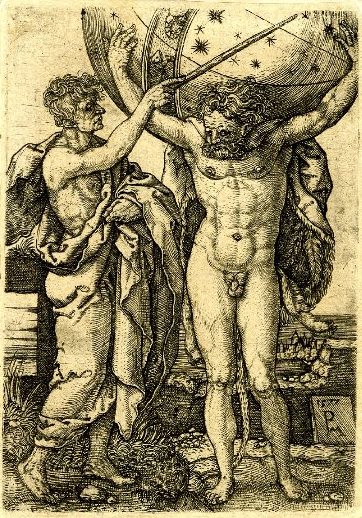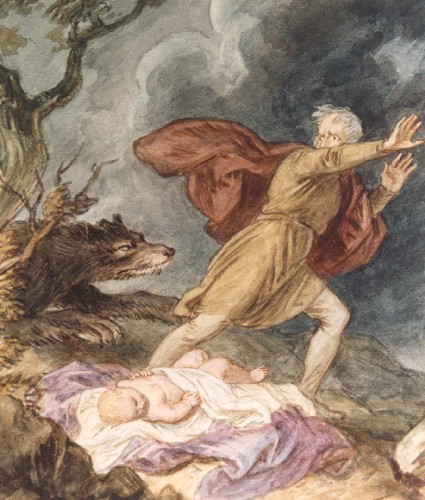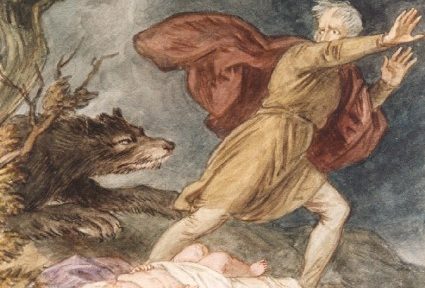This post was contributed by Eva-Maria Lauenstein graduate MA Renaissance Studies student at Birkbeck’s Department of English and Humanities. As part of her programme, Eva-Maria carried out an internship with the education team at The Globe Theatre on London’s south bank. Here she describes the experience

Peter Maes after Heinrich Aldegrever, The Labours of Hercules, 1577, engraving, 94 × 67 mm, British Museum, London – Copy
The ‘Theatre of the World’, writes Frances Yates, ‘is the “Idea” of the Globe Theatre.’[i] Epitomised in its emblem of Hercules carrying the world on his shoulders, to this day the Globe typifies this view of the multivalence of theatre according to its motto, totus mundus agit histrionem; ‘All the world’s a stage’. This maxim doesn’t merely encapsulate the side of the theatre that visitors experience on a daily basis, but equally the vibrant atmosphere of the world behind the stage.
Working for five months with the education team at the Globe as a research intern has been illuminating, not least because of the moments of wonder passing the boxes and racks of props, and observing the electrifying enthusiasm of the actors as they pour in and out of rehearsals and performances. From writing synopses for almost forgotten plays for the Globe’s Read not Dead performances, to the challenge of unearthing how, precisely, a shepherd of the early modern period passed his day, the internship was a journey of fascinating discoveries that was a pleasure for a theatre lover, but also entailed many opportunities to gain a plethora of new research skills and methods.
Tackling Shakespeare’s more divisive plays
With artistic director Dominic Dromgoole’s final season coming to an end, the winter season’s performances equally mirrored the end of an era by taking on some of Shakespeare’s last plays. The internship allowed me to be part of the encounter with plays that have often baffled and divided critics, The Winter’s Tale, Pericles, Cymbeline and The Tempest. Tracing the romantic air of the pastoral elements of The Winter’s Tale, I particularly enjoyed discovering the role of women in rural communities and how the utopian and romanticised image of the country maid of the stage compared to the harsh and difficult life of poorly regulated wage labour. Equally fascinating was the compilation of a research document on the way in which The Tempest’s Ariel was understood by contemporary viewers as a larger part of a community of the spirit world, delving deeply into the magic, the occult and the otherworldly.
A great way to hone research skills, the internship allows for experimentation with different sources, especially through its invaluable on-site archive and library. The variety of tasks meant that every week posed new challenges and the working to often tight deadlines a good way to pace and structure the work.

John Massey Wright, The Winter’s Tale, c. 1810-1866, watercolour on paper, 19 x 16 cm, Shakespeare Centre, Stratford-upon-Avon
While research into the nature of the plays dominated most of the work, there was equally ample opportunity to build on research skill sets by compiling press reviews and contributing to the collation of material for the website. While some tasks may have seemed daunting at first, the team was always friendly and helpful and fostered an environment of teamwork.
Finally, some of the most fun moments came with a much-needed refresher on the invigorating oddity that was part and parcel of early modern theatre. Assisting in the writing of a blog entry on The Winter’s Tale’s now notorious Exit Pursued by a Bear stage direction, I rediscovered the way in which Shakespeare, to this day, contains unexpected twists and turns that still manage to baffle, frighten and allow audiences to guffaw in an explosion of slapstick-induced comedy. Just so, this research internship has given me unexpected and insightful moments that will continue to inspire my research
Find out more
[i] As quoted in Kent T. Van den Berg, Playhouse and Cosmos: Shakespearean Theatre as Metaphor (London: Associated University Presses, 1985), p. 45.


